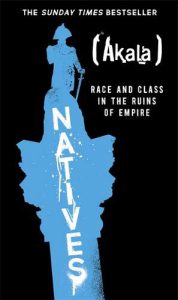Every so often I experience a seismic change of understanding about myself, the world and societal issues. This is often brought about by books. Way back in time, Mike Phillips’ Windrush: The Irresistible Rise of Multi-Racial Britain was a game changer. More recently, I was inspired by Caroline Criado-Perez’s Invisible Women. These books were amazing wake up calls. Reading them felt at once like a punch in the face, a hug, and something akin to the “ice challenge”. Reading them felt like many things I previously only half understood had come into focus, while other things I had never thought to think about were beginning to emerge.
I finally got round to reading Natives: Race & Class in the Ruins of Empire by artist, writer, historian and educator, Akala, as I had been meaning to since he spoke at the ‘sold-out’ King’s Race Equality Network Black History Month event last year.
Akala, who was born in the 80s to a British-Caribbean father and a Scottish-English mother, grew up in a single parent, working class family dependent on free school meals. He is extremely bright and has used his knowledge about his heritage to articulately deconstruct much of our ‘typical’ British social context to reveal new insights – insights that those of us who are like me (also dual heritage, brown skin, a child of immigrants) sort of knew but could never quite put their finger on.
In an extremely direct and accessible way, Akala examines mixed race identity and the racism, reduced expectations and stereotyping he was subject to as a black skinned boy in 80s Britain. He explores the real threats to personal safety he experienced and the attitude of the criminal justice system; how the achievements of people of colour are often detracted from and undermined; the unreality of what we are taught about the ‘British empire’; how stereotypes and media (mis)portrayals skew our perceptions of underrepresented groups; how money and class underpins so much of how people experience and perceive the world; how all these things link to politics and social identity. All in 350 pages or so.
For some, what Akala says will be shocking – both the reality of the lived experiences that he relates and the intellectual concepts he promulgates. For others, like myself, there will be a lack of surprise and a degree of comfort to be found in the universality of the experiences he articulates – not because these things happened, but that they happened to others; that they are a ‘thing’; that I wasn’t imagining it; why it took me so long to recognise the long term impacts on myself.
“racist insults leave you feeling dirty because, even at five years old, we already know on some level that, in this society at least, we are indeed lesser citizens”
I can’t possibly relate how impactful Akala’s book is without taking up thousands and thousands of words – and why would I do that when you can read the book?! Instead I am going to pick out a few things that stood out to me or really helped me hone my thinking.
- How easy it is to be taken in by the current picture of multiculturalism and not realise how recently that was achieved, how hard the fight to achieve it was and how so much is still considered acceptable – e.g. racism in football.
- A key point I have internalised – know yourself and know your history. Check who is telling you what and think about what other points of view and versions of that story there might be. I was in Ghana last year and Japan the year before. In Hiroshima I was really struck by how the various choices America made in dropping the atomic bomb were portrayed with a very clear judgement of the abominable nature of this decision and how different the Japanese perspective on this was to anything I had learnt in school. In Ghana, where the ‘Gold Coast’ marked the beginning of the journey for many slaves, this history is well acknowledged locally. I was equally struck with how understated and sanitised this was in the various museums. How there seemed to be no blame or acknowledgement of the power dynamics that created slavery or the legacy that power dynamic created, which lives on to this day.
- What Akala refers to as White Supremacy. I know, as I write that, a lot of readers will find it difficult to read. Please do stop and examine your feelings and then carry on reading.
It is important to remember
“White supremacy was a mainstream and openly espoused legal, political and moral imperative until the latter half of the twentieth century so hardly ancient or remote history”
and
“modern British identity grew with and was shaped by the fundamentally and undeniably racist British empire”
I have done a lot of thinking about this since reading the book and the best way I can help people think about it is in terms of how we have come to understand and accept ‘the patriarchy’.
“Patriarchy is a social system in which men hold primary power and predominate in roles of political leadership, moral authority, social privilege and control of property.”
While there are still people that argue against the patriarchy’s existence, it seems to me it is generally accepted and understood as a concept: a structure that actively maintains gender inequality.
If you read that across and see the same sentiment in white supremacy and recognise that
“even discussing whiteness can be uncomfortable for people who have taken their white identity for granted, who think of themselves as unaffected by all that race stuff, but there is now a good body of work on the history of ‘whiteness’ that we ignore at our peril.
Alongside acknowledging
“Whiteness can usually be taken for granted by those that it protects; the absence of whiteness can literally be the difference between life and death “
and
“The concept of whiteness goes hand in hand with the concept of white supremacy”
Growing up I was very much brought up to know and believe
“British identity, despite all of the liberal rhetoric to the contrary, is obviously seen as synonymous with whiteness;”
My parents were clear that I would have to work twice as hard. My experiences at school and elsewhere showed that there were different rules and perspectives for me as a brown skinned woman. We didn’t have the language or understanding then but fundamentally my parents had been conditioned to understand their place in the world and were doing their best to help me navigate what they saw and accepted as the hostile road ahead of me.
So, where does that take us? We can’t change history, but we can learn from it. We can work on how we want the future to be. We can only do that with honesty. We need to come to terms with the fact that
“Despite all the rhetoric about meritocracy and equality of opportunity, Britain is still – like every nation on earth to some degree – a society where the social class and area you are born into will determine much of your life experiences, chances and outcomes”
And
“we are all influenced by what we are exposed to and experience; the best we can hope for is to try and be as fair as possible from within the bias inherent in existence”.
That’s why I urge you to do what you can to educate yourself, consider your own positions of power and innate thoughts and challenge yourself to recognise what you have accepted without question and what that means for social equality.

